Blog Archives
‘Pericles’ by Fiasco Theater a Joyful, Redemptive Must-See at CSC
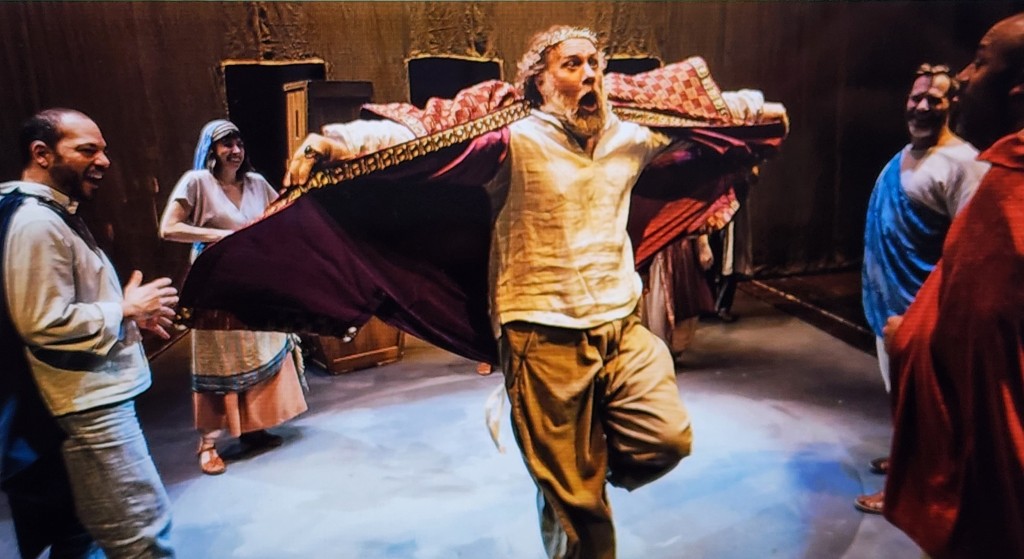
Fiasco Theater’s Pericles presented by CSC is one of William Shakespeare’s works written in the twilight of his career that reveals a “hero” who the fates torment and play with until it is enough, and he receives his wish of a fulfilled life with family. The production directed by Ben Steinfeld is stylized and cleverly wrought, advancing storms, shipwrecks, kidnappings and more with the ingenuity and charm joyfully delivered with as little forced spectacle as possible, yet with an intriguing, bold and seamless minimal set and prop design. Currently at CSC until March 24, this is a must see which Fiasco has brought for us to appreciate.
Steinfeld is Gower, the troubadour whose tale this is. Through his music, lyrics and poetry he sets up the play and requires the audience to use their imagination to become involved with Pericles of Tyre’s harrowing and amazing adventures of a lifetime. Steinfeld’s Gower introduces every section and gives a summation of events essentially cluing in and reminding the audience to stay focused and attentive. He leads the cast in song initially and establishes the mood for each of the acts, making sure to recap the events in rhyme after the audience returns from the 10 minute intermission before Act 2.
There are four actors who portray Pericles and give their timber to each scene and adventure that Pericles experiences as he goes on a hero’s journey learning wisdom, perseverance, patience and fortitude, struggling to overcome whatever Fortune brings.
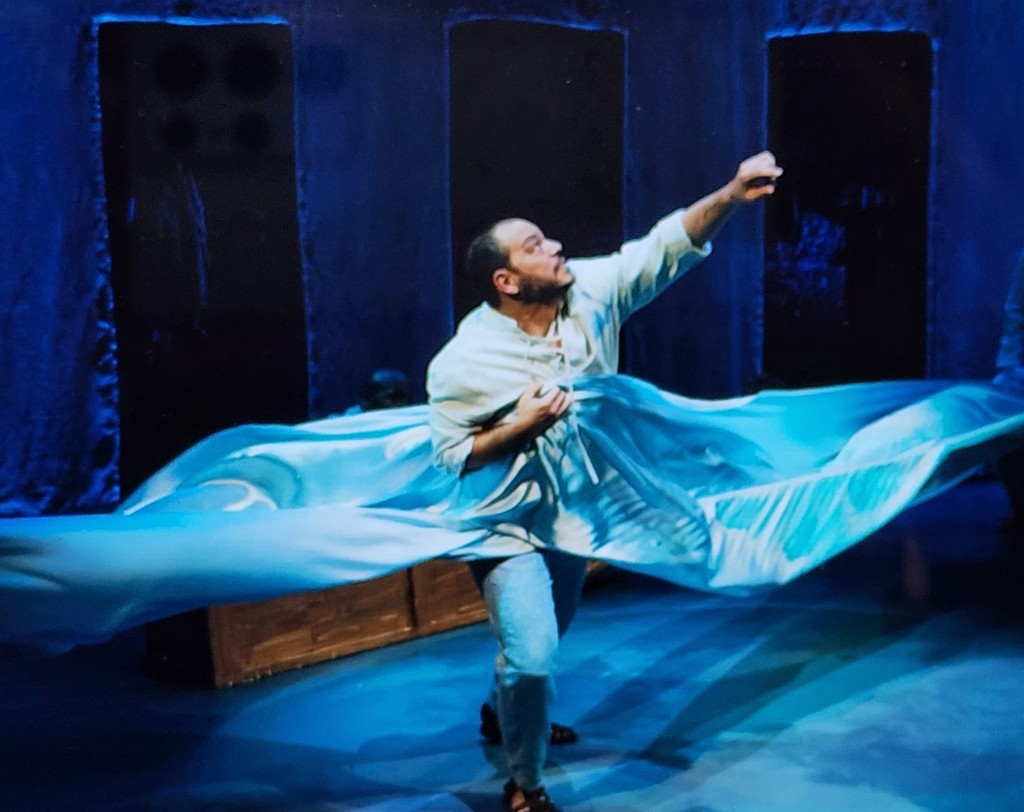
The first Pericles is Paco Tolson who journeys to the kingdom of Antioch where he must solve a riddle to marry King Antiochus’ (Noah Brody) beautiful daughter (Emily Young). If he doesn’t solve the riddle, he forfeits his life and hangs like the other suitors in the public square which the creative team and actors simplistically yet fearfully stage with staffs and boxes/crates. Hearing the riddle, Pericles shows his brilliance apart from all the suitors who have courted the king’s daughter and died. He understands King Antiochus’ treachery. The riddle infers the king’s incestuous relations with his daughter, who he will never give to a suitor.
Upon realizing this horrid circumstance, Pericles also realizes his own fate. Either way, if he reveals the riddle and exposes the king’s sin to public humiliation or doesn’t, he’s a dead man.
Making his excuses, Pericles ends up escaping Antiochus’ kingdom. He intuits the king will figure out why he left and come after him, so Pericles goes on a journey to Tarsus where King Cleon (Devin E. Haqq) and Dionyza (Titiana Wechsler) make their home and suffer through the dire misery of famine that has struck their lands. Knowing their plight, Pericles brings corn to Tarsus’ starving people and saves them from death. Forever grateful, King Cleon makes Pericles revered and celebrated in the land with friendship and goodness. However, we learn that kings are political and variable and circumstances change to sever the friendship.
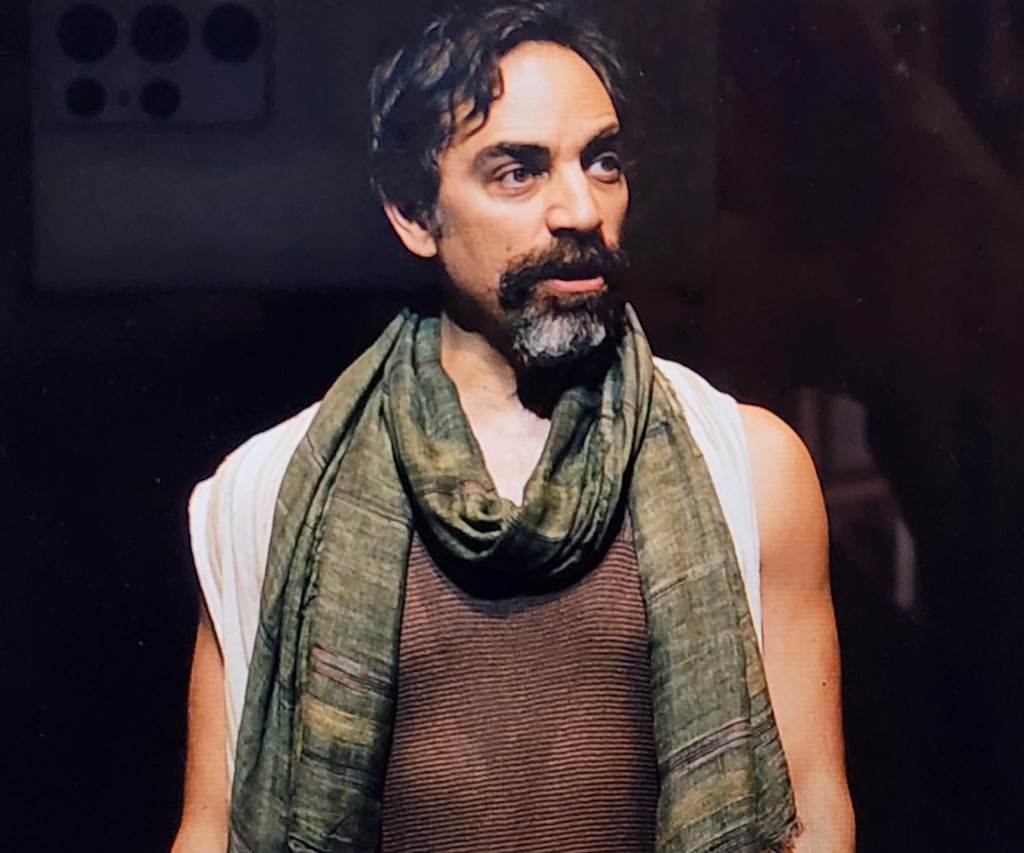
For the moment in his life’s travels Pericles is unaware of the possibility of deceit and betrayal. Called back to his home in Tyre by the administrator he left in charge, Helicanus (Paul L Coffey), Pericles once more bares himself to Neptune’s wrath on the fickle Mediterranean where the god upends and destroys his ship. Fiasco Theater’s inventiveness of Pericles braving the storm’s fury (Mextly Couzin’s lighting design and the Fiasco’s production design), using a bolt of cloth to suggest the tempestuous waves, maintains the stylized, roughly-hewn playfulness of the production. The soft, shimmery cloth symbolizing the waves belies the irony of Pericles’ situation on the roiling sea.
Pericles loses everything but his life and is washed up on the shores of Pentapolis. There, he is at the mercy of the fishermen who find him and change his fortune with happy information. Pentapolis is ruled by the goodly King Simonedes, (the humorous Andy Grotelueschen), a pleasant reversal of the kings who have gone before.
Shakespeare contrasts the kingdoms and their kings: the first is a lecherous murderer, the second variable in deceit and this third king. The fun loving Simonedes is popular even to the lowly fishermen who tell Pericles that the king holds a tournament and feast for his daughter’s birthday. The celebration is so that Thaisa (Jessie Austrian) may find suitors among the knights who joust for her. When Pericles’ armor washes ashore, the fishermen encourage him to compete for the king’s daughter. Shakespeare makes it a key point that though he is a stranger (an migrant) in their midst, he receives their country’s hospitality and mirth.
Pericles wins the jousting matches, performed with the sames staves Fiasco used to suggest the suitors’s hanging in Antioch. It is an example of how the theater company employs the props efficiently and meaningfully to emphasize themes of power, leadership and control. Through their variable exchange we note the contrast between the kingdoms and their rulers’ leadership, either deceitfully tyrannical or happily beneficent.
After the tournament, King Simonedes invites all the knights for a feast. The wooden crates which have been used as a throne, to circumscribe walls, etc., are now used to effect a long feast table. And there, Pericles (Titiana Wechsler portrays Pericles in this segment) gains the king’s favor and the love of Thaisa.
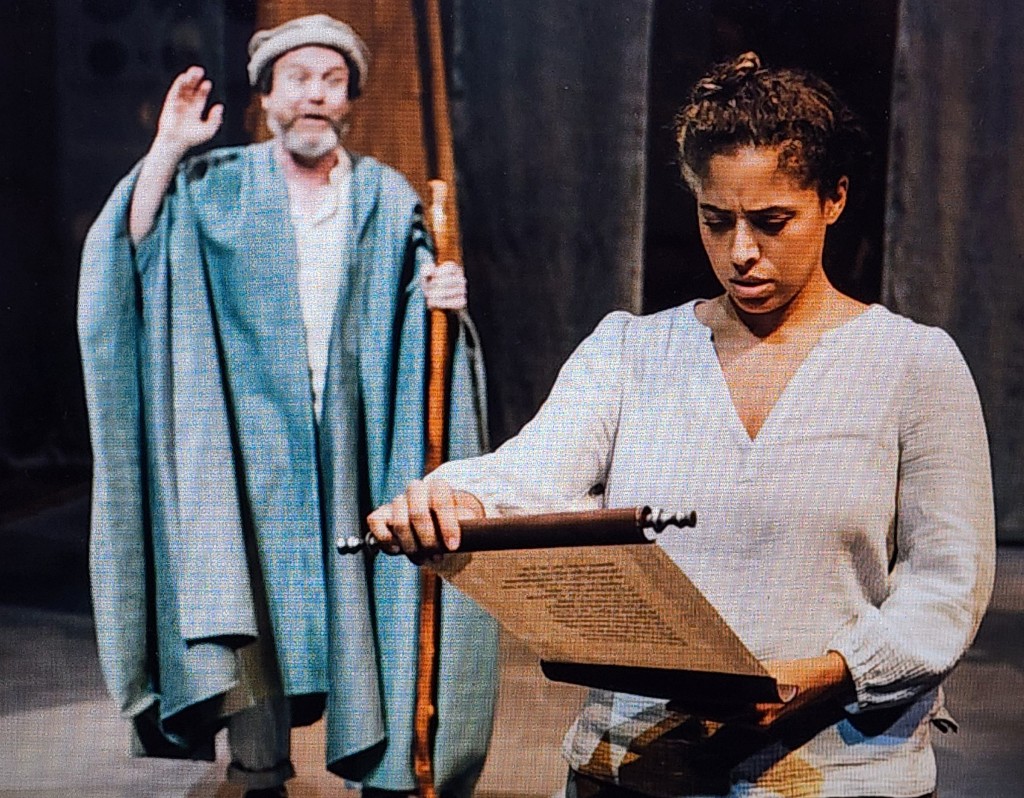
For his pains and pleasure, the Simonedes playfully uses reverse psychology to have the couple declare their love to each other by pretending to forbid their union. Jokingly, he reveals his pleasure at their marriage which produces an heir. In the next scene we see that a pregnant Thaisa, and husband Pericles (Noah Brody in this version) go on an ocean voyage back to Tyre to check on his kingdom.
Again, there is a storm at sea and dire circumstances. Thaisa who dies in childbirth must be thrown overboard to steady the ballast or the ship will sink. Pericles prepares her coffin with spices and jewels with a note to whomever finds the coffin to bury his wife whom he greatly loves. The child who was born as Thaisa died Pericles names Marina. To redeem the time, Pericles leaves Marina with those who revere him in the land of Tarsus. King Cleon and Dionyza promise to care for Marina like she is their own, while he returns to rule Tyre.

The staging of the scene where Marina is given to King Cleon is simultaneously juxtaposed with the fate of Thaisa whose coffin washes ashore at Ephesus. The director makes excellent use of the space at CSC to clarify what happens. As Pericles hands over baby Marina to his friends, a woman with powers of healing (Tatiana Wechsler with hair down in flowing priestly robes) restores Thaisa back to life. So thankful is Thaisa that she becomes a devotee of Diana and officiates at her temple. Meanwhile, Pericles is heartbroken and grieves his dead wife but joys that his child is being raised well. As fate would have it, during the fifteen years Marina has been brought up with the daughter of Dionyza, things grow problematic.
Dionyza envies Marina’s beauty and talents and decides she must be murdered for the sake of her own daughter, so their child will shine if the glory of Marina is removed. Though Cleon opposes Dionyza’s evil act, he is powerless to stop her. But just as Marina is about to be killed, pirates kidnap her and thwart the murder. In the following sequences, Gower shifts the mood once more and the riotous humor of how Marina’s chastity is used to great effect proves comical in a brothel run by Bolt (Andy Grotelueschen) and Bawd (Jessie Austrian). There, Emily Young’s Marina turns away the lusty, hot clients who are horrified that she pushes her virginity onto them and attempts to make them Diana (the feminist of the time) devotees. Of course the irony is that Thasia, her mother, is back in Ephesus praying as a Diana devotee.
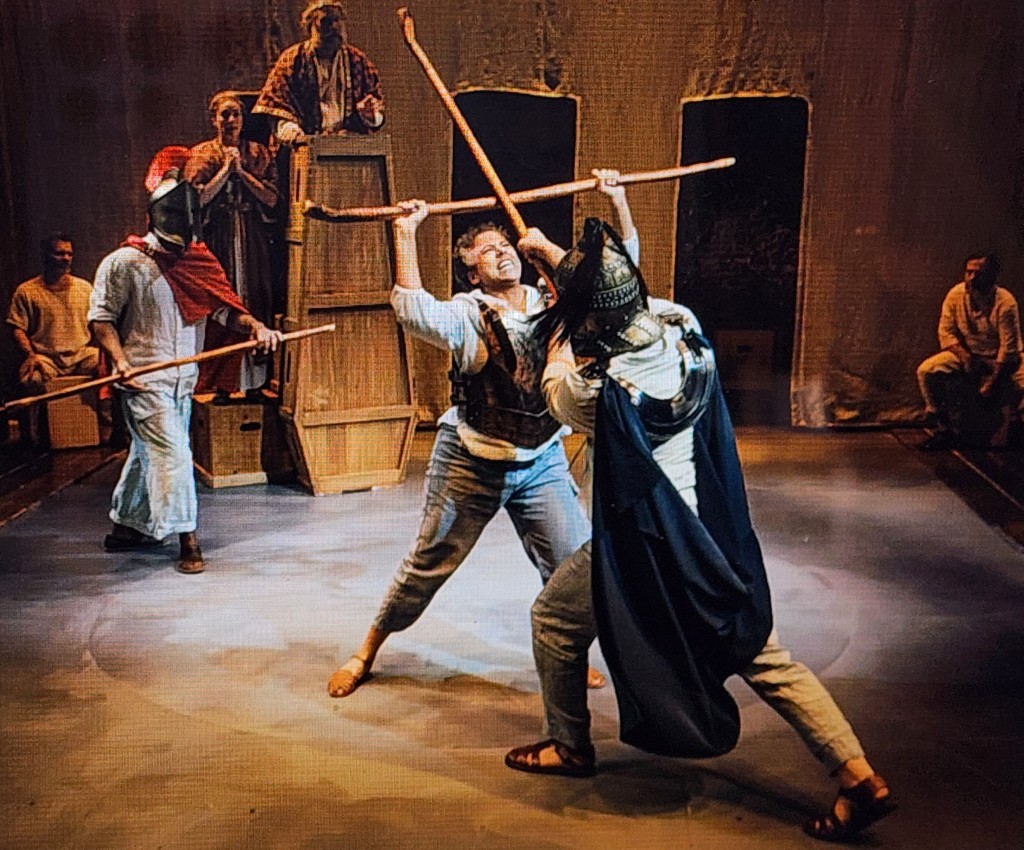
In the second act, Fiasco’s farcical skills shine and the atmosphere shifts from Fate’s woes to merriment at those lecherous males who should be ridiculed for their unseemliness. However, when it is least expected, Pericles, who returns to Tarsus to bring his daughter back to Tyre to rule with him, discovers through Cleon that Marina drowned. Indeed, King Cleon and his wife have betrayed Pericles’ goodness and there is no punishment for them as there was for King Antiochus who the gods burned up. It would seem that incest is the worst crime when it begets murder. Dionyza’s intention of murder the wicked pirates interrupted; it is an irony is that the pirates evil act is turned around for goodness. Dionyza’s envy and murderous intention the gods leave to her and Cleon’s consciences to seek redemption.
Inconsolable that she is gone, Pericles (an excellent David E. Haqq in the last, most emotional segment) will not speak and is dead in spirit. How events change magically to effect Pericles’ reunion with his wife and daughter is poignant and heart-rending, if not fanciful in hope. Interestingly, Shakespeare makes abundant use of the Deus ex Machina (the gods interrupt evil fate to save the hero) in Pericles. As Gower and the cast conclude the tale of Pericles, King of Tyre, we are uplifted by the grace of a happy ending, and the redemption offered to Marina, Pericles and Thaisa because of their goodness, devotion to the values of truth, generosity, decency and steadfastness.
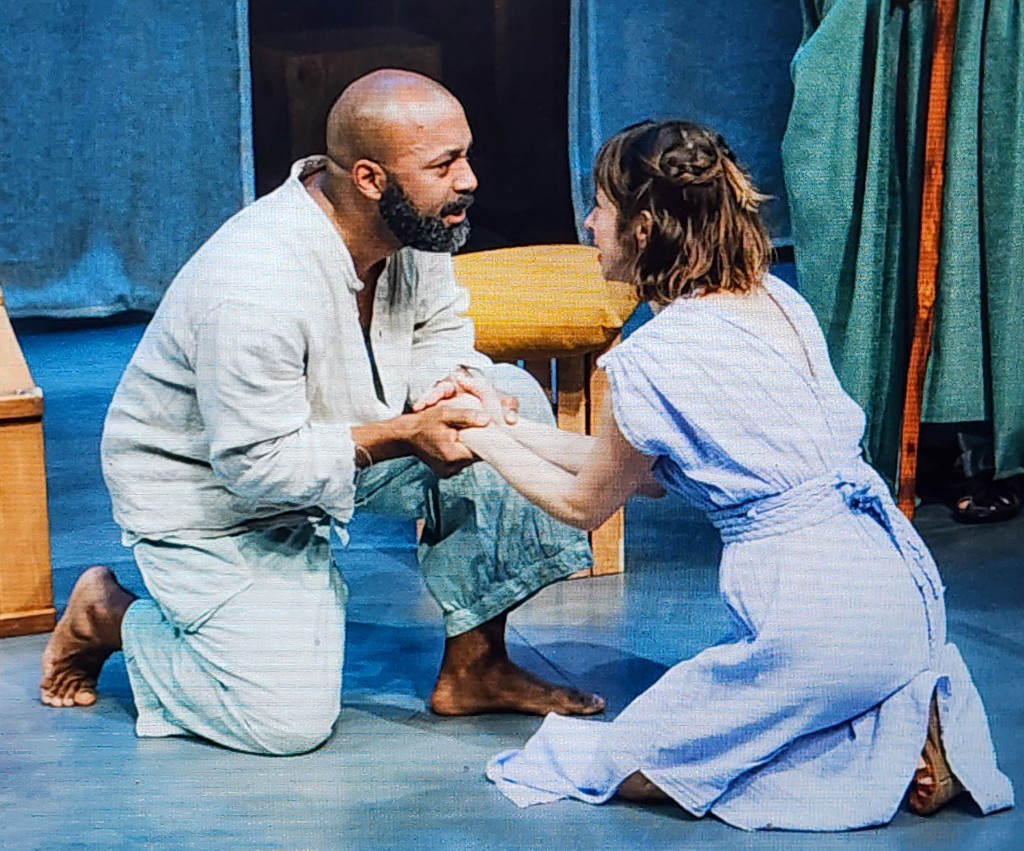
The strengths of this production include the fine ensemble’s seamless acting which provides the coherence throughout, even though the character of Pericles has four actors which was initially confusing. The whimsical and at times farcical, lighthearted approach toward myth-making and storytelling through music, rhyme, dance and song are superbly balanced throughout. The stylization is the correct choice for a play that gyrates throughout voyage, disaster, and roller coaster storms that metaphorically parallel human joys and sorrows.
That the play has been spurned as silly and not worthy of being produced has been a misread of the depth of one of Shakespeare’s most trenchant latter plays. The life theme is an important one. For those who patiently endure, they gain wisdom in temperance and the power to face and overcome trials of their faith. The obstacles help one all the more appreciate and be grateful for a life that acknowledges human beings live on the brink of peril every moment of their lives. To be numb to that knowledge is to live a zombie death in life.
This is a must-see, for the music, songs, fantasy, laughter and fanciful, profound truth-telling.
Pericles. CSC, 136 E 13th St between Third and Fourth Avenues. Closes March 24th. https://www.classicstage.org/pericles/
”Merrily We Roll Along,’ Strong Performances, an Ebullient, Sleek, Shining Revival at Roundabout

The Company of ‘Merrily We Roll Along,’ presented by Roundabout Theatre Company and Fiasco Theater. Book by George Furth, Music/
lyrics by Stephen Sondheim, directed by Noah Brody (Joan Marcus)
Dramaturgs are most probably familiar with the tribulations of the 1981 version of Merrily We Roll Along, book by George Furth, music and lyrics by Stephen Sondheim, produced by Harold Prince. The musical, based on the titular play by George S. Kaufman and Moss Hart essentially extols youthful ambitions and artistic dreams which may become subverted by practical considerations once success and financial security are achieved. The original Furth/Sondheim musical lacked measured focus but was noted by some for its wonderful score. Though the show closed after more previews than performances, it was nominated for awards and won two.
The concepts highlighted by Sondheim’s music and lyrics are timeless and made especially so in their reworked version of Merrily We Roll Along (1994) which grounds the adapted iteration presented by Roundabout and engendered by the sterling efforts of Fiasco Theater. From the superlative, exciting performances by a “gang of six” headed up by the three principals, Jessie Austrian, Manu Narayan and Ben Steinfeld and directed with precision and adroit sensitivity by Noah Brody, this thematically poignant production resoundingly works (rare praise coming from a lukewarm Sondheim fan). I found the energetic pace, incredible plot structure and imaginative set design that paid tribute to theaters of the past (and Sondheim’s work) delightful and funny. Altogether, the artistic design, staging, costumes, sound design, and the ensemble’s superlative acting and singing unfold seamlessly in the service of uniquely structured storytelling that many should appreciate.
Certainly, the sheer number of theatrical props on library bookself-style floor to ceiling walls covering three sides of the stage intrigue. The props, haphazardly arranged appear akin to a “behind-the-scenes” look into symbolic take-aways of the characters’ lives. The theatrical design and tropes provide a fascinating backdrop to the action, the arc of which spins linchpin events in a reverse chronology from 1980 to 1957. It is a period of time which encompasses seven transitions to the precipitating incident when the three protagonists (Mary-Jessie Austrian, Charley-Manu Narayan, Frank-Ben Steinfeld) first meet on a rooftop that turns out to hold a lasting symbolism for them. The flashbacks to crucial years, highlight the melds and fractures of these immensely talented individuals whose dreams, personalities and synergies help to solidify an artistic fount of creativity. It is from this fountain of creativity and their interlocking aspirations that their successes spring forth.

(L to R): Ben Steinfeld, Manu Narayan, Jessie Austrian in ‘Merrily We Roll Along,’ Book by George Furth, Music/lyrics by Stephen Sondheim, directed by Noah Brody, Fiasco Theater’s production at Roundabout Theatre Company (Joan Marcus)
However, without their symbiotic energies weaving and flowing together, the fountain dries up. As we follow the events backward in time, we note the progression and conclude that the waters that once revived them dissipated as did the joy, hope and vibrance of creative, encouraging friendship. It is this that Frank remembers at the outset of the play and which is the initiating incident of all the scenes that flow back into the past. We shadow Frank as he relives and remembers key times and places that led to his separation from his friends. The three when we meet them in 1980 are successful and rest on their laurels. However, their greatness which is embedded in their friendship with each other is behind them. It is this tri-parte greatness that Frank (the excellent Ben Steinfeld) seeks in the beginning of Merrily We Roll Along.
And it is this greatness that Frank understands he has lost in an epiphany at the conclusion of the extended flashback which switches back into the present. He knows when his friendship ended with Mary (Austrian is absolutely wonderful) and Charley (Narayan brings down the house with “Franklin Shepard, Inc.”), that he lost the best part of himself. Whether he makes a determined effort to rekindle his relationship with Mary and Charley to recapture what they had is uncertain and sadly, not even alluded to as the lights dim.
The play’s structure as we chronicle the journey back to their first sparks of friendship is revelatory. When we witness the older individuals and their various partners at the outset of the play, these successful people are “played out,” grossly unspectacular and unoriginal. We do not relate to them, and feel disengaged from Frank’s “matter-of-fact” attitude as he sings “Rich and Happy.” But the song belies the truth and he and others question how they arrived at their aggressive and truly unhappy, unfulfilled state. There is a “movie-like” rewind (a transition which segues into the past), and the characters get to experience what most of us don’t get to see: the pivotal events that cause them to be where they are, when they don’t wish to be there at all.

(L to R): Ben Steinfeld, Paul L. Coffey, Brittany Bradford, Emily Young in ‘Merrily We Roll Along,’ Book by George Furth, Music/lyrics Stephen Sondheim, directed by Noah Brody, Fiasco Theater’s production at the Roundabout Theatre Company (Joan Marcus)
In the brilliance of the play’s structure we chronicle Frank’s and the other’s flashback to the greatness they lost with various songs (“Like It Was,” “Franklin Shephard, Inc.”, “Old Friends,” “Growing Up,” through to “Our Time”). With the songs and transitional refrain (“Merrily We Roll Along”) taking us to their former times, the characters fill out and become personable individuals with whom we readily identify. Because of the ensemble’s acting skills and the director’s attention to detail, we joy to their humanity and feel ebullient with them, witnessing how they “made it.” However, we realize there is a caveat: success is another type of failure if one allows it to overthrow priorities and values that are based in goodness.
When we finally witness Mary’s, Frank’s and Charley’s serendipitous meet up on the rooftop when they solidify an uncanny unity, we make the connection to their twenty years later selves. Yes, years later they have “grown up.” But they have sacrificed, not their youthfulness, but their hope. They’ve lost the eternal innocence that initially ignited their artistic ambitions and happiness when they “found” each other.
It was this eternal innocence that synergistically drove them, encouraged them, sustained them through the “hard” years before they achieved success. However, after each becomes successful in their own right, they allowed their friendship to be sacrificed on the altar of celebrity. Their triumph is hollow, their latter-day efforts are uninspired. It is an incredible irony that in “the seeking” is the fun and adventure. With success comes another myriad of torments. And without your friends to hear you out and go through the miseries with you, it is especially painful. So it is for Mary, Charley and Frank.
To round out the acting “gang of six” are Brittany Bradford who portrays Beth, Meg and K.T. Her “Not a Day Goes By,” is just great in its emotional power and resonance. Paul L. Coffey and Emily Young are excellent as foils to each other portraying the producer, husband, actress, divorced and devolved. Carefully they authenticate the specifics of these individuals that confound Mary’s, Charley’s and Frank’s friendships with each other.

(L to R): Jessie Austrian, Ben Steinfeld, Manu Narayan in ‘Merrily We Roll Along,’ Book by George Furth, Music/lyrics by Stephen Sondheim, directed by Noah Brody, Fiasco Theater’s production at Roundabout Theatre Company (Joan Marcus)
Coffey’s upward development of Joe from failed producer to top of the world success is great (rewinding from the present to the past). Young’s upward development of neophyte actress and wife, who throws over Joe for Frank is excellent. The ebb and flow of success and failure in the marriages and relationships between Frank, Beth, Gussie, Joe characterizes the show business life. Meanwhile, Charley and Mary manage to hang on to their steady state (though Mary never marries). The contrast between the two groups is fascinating. It is clear how the demands of the producing/acting/songwriting lifestyles overthrow stability as these characters swim and tread water in an ever-changing sea of transitions.
Fiasco Theater’s re-imagining of Merrily We Roll Along is sharp, engaging, humorous, heartbreaking. The themes of friendship, regret and loss examined using flashbacks are clearly drawn through the music which is dynamic and exceptional. Sondheim touched upon the ineffability of friendship’s innocence and beauty and used that to drive the show forward into the remembrances of the past. The transitions beginning with the “Big Rewind” are excellent as the “gang of six” “rolls merrily along further into the convoluted turning points that got them to where they are decades later.
Some numbers are riotous, for example Austrian’s transformation into her thinner, unalcoholic self. Her vomiting up the booze “in the rewind” is super smart and hilarious. “Bobby and Jackie and Jack,” a song Charley, Beth, Frank and Mary perform at the Downtown Club is fun, and nostalgic for those who remember the Kennedys. The excitement of “It’s a Hit!” sung by Joe, Charley, Frank, Mary and Beth when their show is a success is exuberant and effervescent. And “Old Friends” is just spectacular. emotional and stirring. It is the kindling of the show’s fiery brightness.

(L to R): Jessie Austrian, Manu Narayan, Brittany Bradford, Ben Steinfeld in ‘Merrily We Roll Along,’ Book by George Furth, Music/lyrics by Stephen Sondheim, Fiasco Theater’s production at the Roundabout Theatre Company (Joan Marcus)
Most importantly, the cast authentically, magnetically fulfills in their various portrayals what Sondheim and Furth wanted to express: themes about friendship gained and lost, the synergies of creativity, the wonder of manifesting the creative process, and the corruptions that undermine the best of one’s self, for example prizing financial gain above all else.
The production is complex and rich. It should be seen, especially if you saw another version of Merrily We Roll Along. Fiasco Theater’s smashing adaptation is not to be missed. And if you didn’t see an earlier version, be happily enthralled while enjoying the depth of this production which is a clever, profoundly poignant “every-person” memoir of gaining and losing oneself. Finally, the work is a paean to friendship which in this show starts in the forever and ends up with protagonist Frank and the others staring into the abyss of regret. Is there a warning here in the “Age of Trumpism?”
Special Kudos to all creatives and The Band: Conductor/Piano-Emily Whitaker and these musicians: Giuseppe Fusco, Ansy Francois, Jeremy Miloszewicz, Jami Dauber, Hidayat Honari, Matt Aronoff, Janna Graham. Music Coordinator: Meg Zervoulis; Music Preparation: Conor Keelan.
Merrily We Roll Along runs without an intermission at the Laura Pels Theatre, Harold and Miriam Steinberg Center for Theatre (111 West 46th Street) until 7 April. You can purchase tickets at (212) 392-6308 or at their website by clicking HERE.